Module 2 Public holidays Unit 1课件(共39张PPT,内嵌音频)2024-2025学年外研版(2024)九年级上册
文档属性
| 名称 | Module 2 Public holidays Unit 1课件(共39张PPT,内嵌音频)2024-2025学年外研版(2024)九年级上册 |
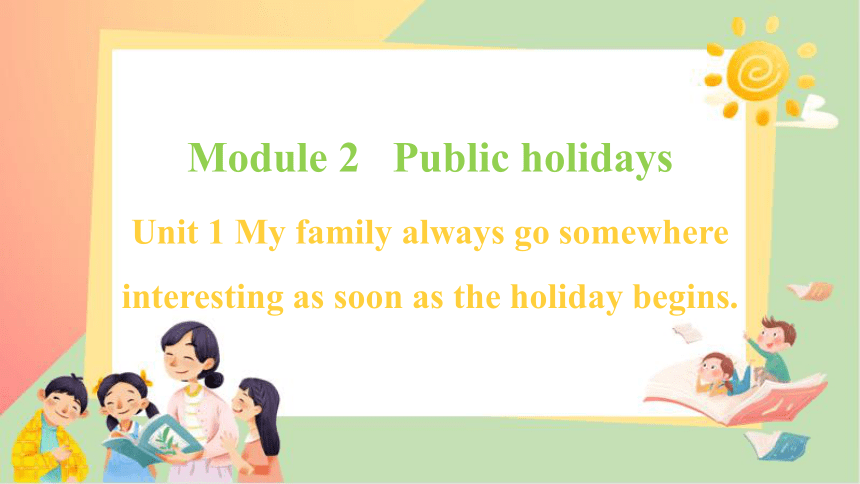
|
|
| 格式 | pptx | ||
| 文件大小 | 8.6MB | ||
| 资源类型 | 教案 | ||
| 版本资源 | 外研版 | ||
| 科目 | 英语 | ||
| 更新时间 | 2024-11-10 00:00:00 | ||
图片预览

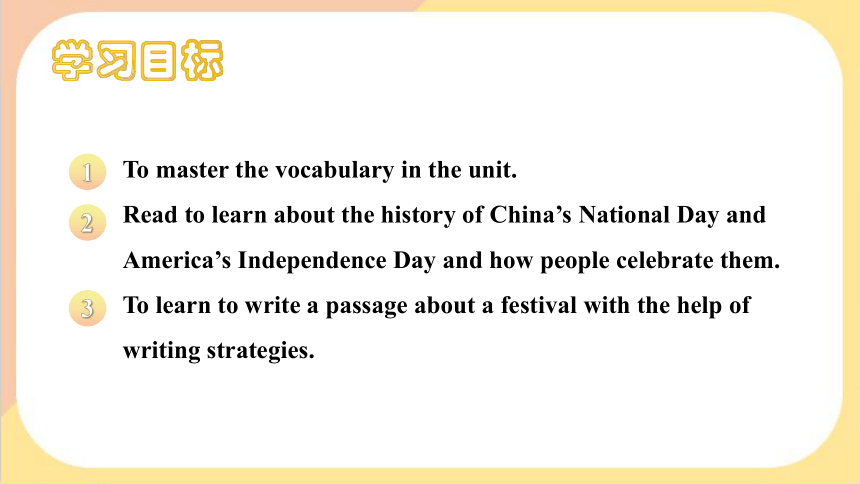
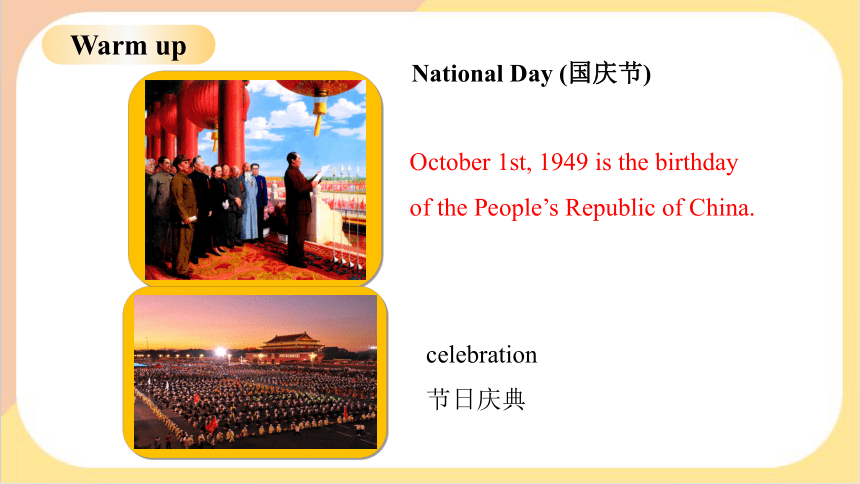
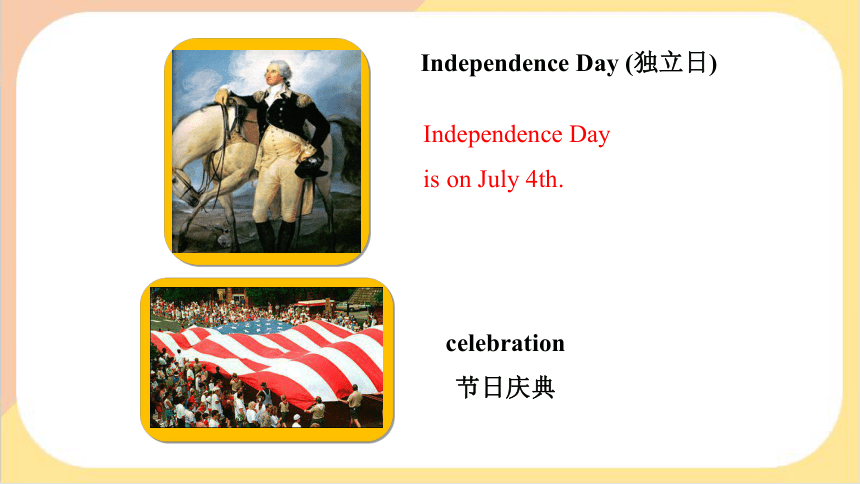
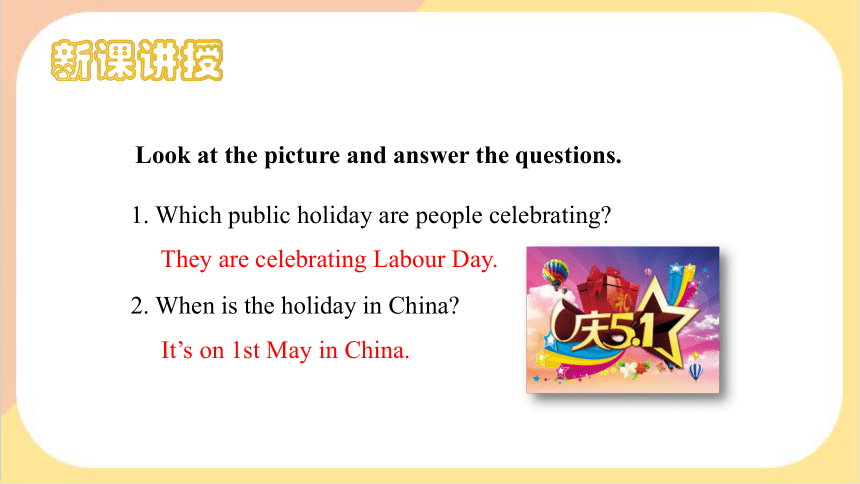
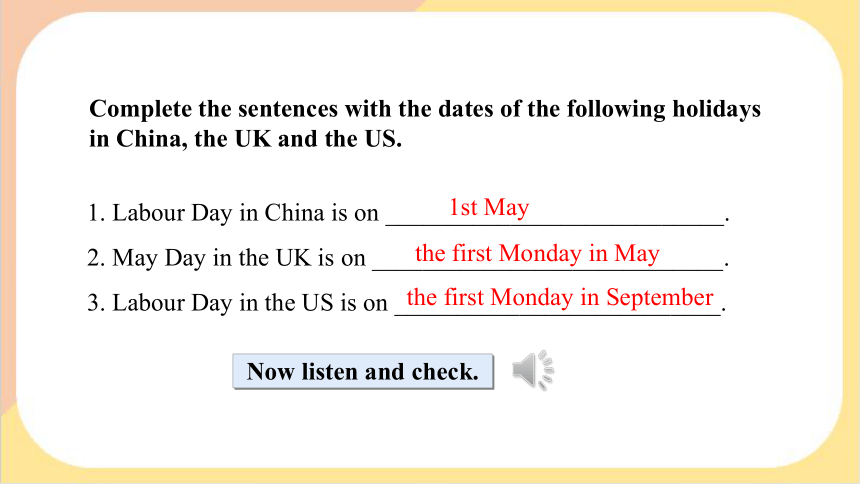
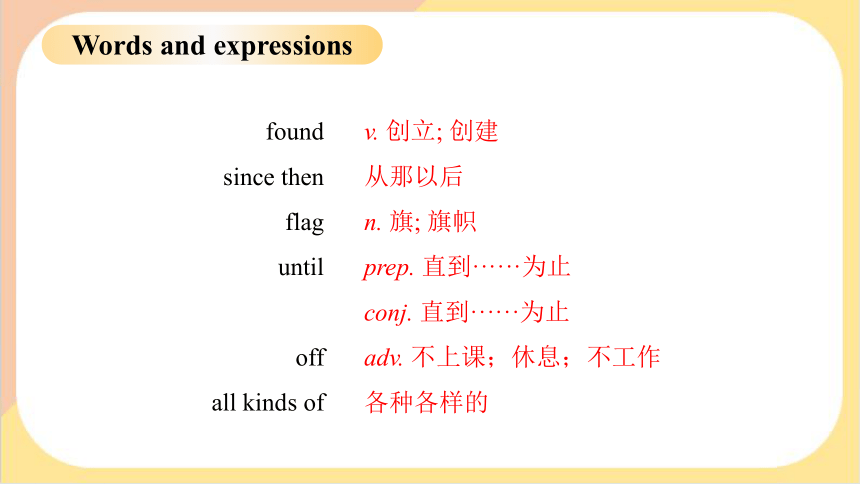

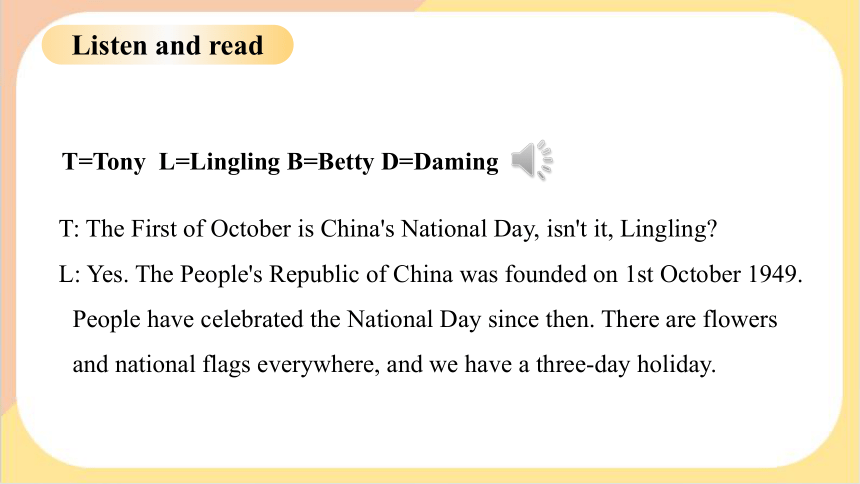
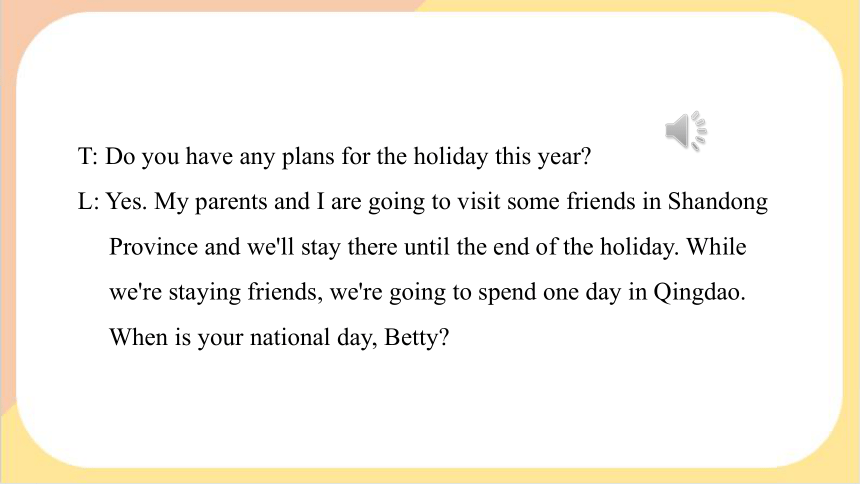
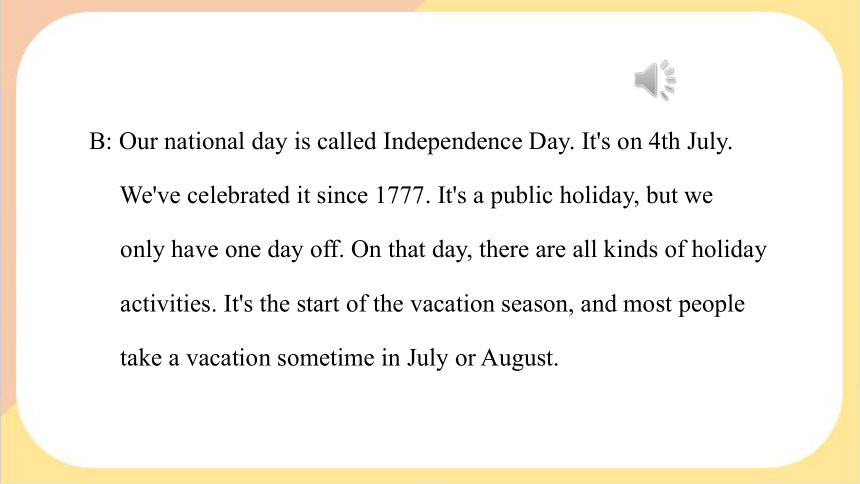
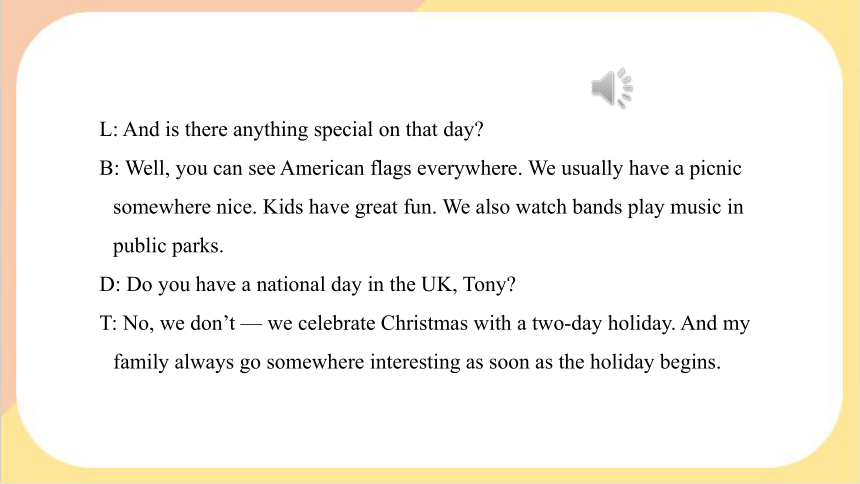
文档简介
(共39张PPT)
Module 2 Public holidays
Unit 1 My family always go somewhere interesting as soon as the holiday begins.
To master the vocabulary in the unit.
Read to learn about the history of China’s National Day and America’s Independence Day and how people celebrate them.
To learn to write a passage about a festival with the help of writing strategies.
学习目标
1
2
3
October 1st, 1949 is the birthday of the People’s Republic of China.
National Day (国庆节)
celebration
节日庆典
Warm up
Independence Day
is on July 4th.
Independence Day (独立日)
celebration
节日庆典
1. Which public holiday are people celebrating
2. When is the holiday in China
Look at the picture and answer the questions.
They are celebrating Labour Day.
It’s on 1st May in China.
新课讲授
1. Labour Day in China is on ___________________________.
2. May Day in the UK is on ____________________________.
3. Labour Day in the US is on __________________________.
the first Monday in September
Complete the sentences with the dates of the following holidays in China, the UK and the US.
1st May
the first Monday in May
Now listen and check.
found
since then
flag
until
off
all kinds of
v. 创立; 创建
从那以后
n. 旗; 旗帜
prep. 直到······为止
conj. 直到······为止
adv. 不上课;休息;不工作
各种各样的
Words and expressions
vacation
take a vacation
season
kid
have fun
band
as soon as
n. 假期; 假日
去度假
n. 度假旺季;节期
n. 小孩
玩得高兴;有乐趣
n. 乐队
一······就······
T: The First of October is China's National Day, isn't it, Lingling
L: Yes. The People's Republic of China was founded on 1st October 1949. People have celebrated the National Day since then. There are flowers and national flags everywhere, and we have a three-day holiday.
T=Tony L=Lingling B=Betty D=Daming
Listen and read
T: Do you have any plans for the holiday this year
L: Yes. My parents and I are going to visit some friends in Shandong
Province and we'll stay there until the end of the holiday. While
we're staying friends, we're going to spend one day in Qingdao.
When is your national day, Betty
B: Our national day is called Independence Day. It's on 4th July.
We've celebrated it since 1777. It's a public holiday, but we
only have one day off. On that day, there are all kinds of holiday
activities. It's the start of the vacation season, and most people
take a vacation sometime in July or August.
L: And is there anything special on that day
B: Well, you can see American flags everywhere. We usually have a picnic somewhere nice. Kids have great fun. We also watch bands play music in public parks.
D: Do you have a national day in the UK, Tony
T: No, we don’t — we celebrate Christmas with a two-day holiday. And my family always go somewhere interesting as soon as the holiday begins.
We only have one day off.
Well, …
Everyday English
China US
Holiday
Date
Duration
Ways of celebration
Year the celebration started
National Day
1st October
three days
1949
flowers and national flags everywhere
Independence Day
4th July
one day
1777
all kinds of holiday activities American flags everywhere have picnics, watch bands play music
Now complete the table.
1. When was the People’s Republic of China founded
2. Do people have one day off on Independence Day
3. Does Lingling have any plans for the National Day this year
4. When is the start of the vacation season in the US
5. Do people have a national day in the UK
On 1st October 1949.
Yes, they do.
Yes. She and her parents are going to visit some friends in Shandong Province.
Independence Day.
No, they don’t.
Read and answer the following questions.
May Day/Labour Day
National Day
Independence Day
be founded
since then
national flags
a three-day holiday
make a plan
public holiday
have one day off
五一劳动节
国庆节
独立日
被创建
自从那时候起
国旗
一个三天的假期
制订一个计划
公共假期
休息一天
Translate these phrases into English.
on that day
all kinds of
holiday activities
vacation season
take a vacation
something special
have a picnic
somewhere nice
as soon as
have (great) fun/enjoy oneself
在那一天
各种各样的
假期活动
假期季
度假
特殊的事情
野炊
某些好玩的地方 一······就
玩得开心
1. The People’s Republic of China was founded on 1st October 1949.
found 表示“建立;创立”。它的过去式和过去分词都加-ed。
find 表示“找到”, 它的过去式和过去分词为 found。
Her family founded the college in 1895.
她的家庭于1895年创办了这所学院。
I have found my lost bag.
我已经找到了我丢失的包。
Language points
2. People have celebrated the National Day since then.
since then 从那以后, 用于现在完成时。
He has lived in Beijing since then.
从那以后他就一直住在北京。
3. … but we only have one day off.
off 不上课;休息;不工作
圣诞节期间我会休假一星期。
I’m taking a week off over Christmas.
我准备休一段时间假。
I’m going to have some time off.
4. On that day, there are all kinds of holiday activities.
all kinds of 各种各样的
你能品尝各种各样美味的食物。
You can taste all kinds of delicious food.
5. … and most people take a vacation sometime in July or August.
take a vacation 意为“度假”
他下周将去度假。
He will take a vacation next week.
6. And is there anything special on that day
anything special 特别的事
形容词修饰不定代词或不定副词时, 要放在不定代词或不定副词的后面。
如:anything special, somewhere interesting
不要做傻事。
Don’t do anything stupid.
7. Kids have great fun.
have fun 玩得高兴、玩得愉快
= enjoy oneself = have a good time
The children had great fun/enjoyed themselves/had a great time at the sports meet.
孩子们在运动会上玩得非常开心。
时间状语从句就是用一个句子来表达一件事情或一个行为发生的时间。
时间状语从句根据其所表示的时间不同, 所使用的连词也不同。
时间状语从句常用引导词:
when 当……时(从句谓语可以是延续性或短暂性动词)
while 正当……时(从句谓语用延续性动词)
as 当……时 since 自从……以来
until 直到 not … until … 直到……才……
as soon as 一……就…… before 在……之前
after 在……之后
The adverbial clause of time (时间状语从句)
Grammar
由when连接的时间状语从句
when表示时间点时,从句中用短暂性性动词;
when表示时间段时,从句中用持续性性动词。
When I got home, my family were already having dinner.
我到家的时候,全家已在吃晚饭。 (when表示时间点)
When they were still talking and laughing, the teacher came in.
当他们还在说笑的时候,老师进来了。(when表示时间段)
【注意】
当when意思是“正当……时候”(即 at that moment)时,
when只能跟在前一分句之后。
He was about to go to bed when the doorbell rang.
他正要上床,忽然门铃响了。
They were watching the World Cup when suddenly the lights went out.
他们正看着世界杯比赛,突然灯灭了。
They had just arrived home when it began to rain.
他们刚到家,天就开始下雨了。
由while连接的时间状语从句
1. while通常表示一段时间,从句中宜用持续性动词作谓语。
She fell asleep while she was reading the newspaper.
她在看报的时候睡着了。
2. while有时可以作并列连词,表示对比,可译成“……而……”。
I am fond of English while he likes maths.
我喜欢英语而他却喜欢数学。
由as连接的时间状语从句
1. as表示时间点时,从句中用短暂性动词;
表示时间段时,用持续性动词。as和when两者经常可以通用。
I saw Jim as/when he left the meeting room.
吉姆离开会议室时候我看到了他。
2. as表示 “一边……一边……”,强调从句和主句中两个动作交替进行或同步进行。
They talked as they walked. 他们边走边聊。
3. as表示“随着”。
As time goes on, it's getting warmer and warmer.
随着时间的推移,天气变得越来越暖了。
since表示“自……以来” 。表示动作从过去某一时间点一直延续到说话时间为止。主句中通常为延续性动词的现在完成时;
since从句中一般用短暂性动词的一般过去时。
It has been just a week since we arrived here.
我们到这儿刚刚一星期。
Where have you been since I last saw you
自上次我见过你之后,你去了哪里?
Since she was young, she has been collecting stamps.
她自年轻时起就一直集邮至今。
由since连接的时间状语从句
1. until/till用于肯定句时,表示“直到……为止” ,主句必须为
持续性动词。
We shall wait until/till he comes back.
我们将一直等到他回来。
2. not … until/till表示“直到……才……”,主句通常要用短暂动词。
I didn't leave until/till she came back.
直到她回来,我才离开的。
由until连接的时间状语从句
由as soon as 连接的时间状语从句
as soon as ... 可译为“一……就……” ,
用来表示主从句的动作是紧接着发生的。
He will come and see you as soon as he can.
他一有空就来看你。
He rushed home as soon as he got the good news.
他一得到这个好消息就奔回家。
由before连接的时间状语从句
before 表示“在……之前”。
He studied here before he went to Beijing.
他去北京前在这里学习。
由after连接的时间状语从句
after 表示“在……之后”。
I will go out to play basketball with you after I finish my homework .
我做完功课后就和你一起出去打篮球。
1.The Americans celebrate Independence Day on 4th July.
It is the start of the ________ season.
2. On 1st October, you can see the national _____ everywhere in China.
3. The US was _______ in 1776.
4. What kinds of ________ are there on 1st January
vacation
flags
founded
activities
Complete the sentences with the correct form of the words in the box.
activity flag found vacation
Practice
1st first
2nd second
3rd third
4th fourth
5th fifth
6th sixth
7th seventh
8th eighth
9th ninth
10th tenth
11th eleventh
12th twelfth
13th thirteenth
20th twentieth
21st twenty-first
31st thirty-first
Listen and repeat.
Pronunciation and speaking
巧记序数词
1,2,3要全变,
其余th添后面,
八(eight)去t,
九(nine)去e,
以y结尾,变y为ie,再加th,
five,twelve两兄弟,变ve为f,再加th。
遇到几十几,只变个位就可以。
second (2nd)
third (3rd)
fourth (4th)
fifth (5th)
sixth (6th)
seventh (7th)
eighth (8th)
ninth (9th)
tenth (10th)
eleventh (11th)
twelfth (12th)
February
March
April
May
June
July
August
September
October
November
December
e.g. The first (1st) month is January.
Make sentences.
10th September, 1st October, 4th July, 25th December
Say the dates.
Now work in pairs. Ask and answer questions about important dates.
— When is your birthday
— The tenth of September.
1. When is the holiday
2. What do your family do during the holiday
3. What special food do you eat
4. What special clothes do you wear
Work in groups. Ask and answer questions about a Chinese public holiday.
The Mid-Autumn Festival is usually in September or early October. Family members usually get together. We eat moon cakes while we are enjoying the full moon...
Now present the Chinese public holiday to the whole class.
Module 2 Public holidays
Unit 1 My family always go somewhere interesting as soon as the holiday begins.
To master the vocabulary in the unit.
Read to learn about the history of China’s National Day and America’s Independence Day and how people celebrate them.
To learn to write a passage about a festival with the help of writing strategies.
学习目标
1
2
3
October 1st, 1949 is the birthday of the People’s Republic of China.
National Day (国庆节)
celebration
节日庆典
Warm up
Independence Day
is on July 4th.
Independence Day (独立日)
celebration
节日庆典
1. Which public holiday are people celebrating
2. When is the holiday in China
Look at the picture and answer the questions.
They are celebrating Labour Day.
It’s on 1st May in China.
新课讲授
1. Labour Day in China is on ___________________________.
2. May Day in the UK is on ____________________________.
3. Labour Day in the US is on __________________________.
the first Monday in September
Complete the sentences with the dates of the following holidays in China, the UK and the US.
1st May
the first Monday in May
Now listen and check.
found
since then
flag
until
off
all kinds of
v. 创立; 创建
从那以后
n. 旗; 旗帜
prep. 直到······为止
conj. 直到······为止
adv. 不上课;休息;不工作
各种各样的
Words and expressions
vacation
take a vacation
season
kid
have fun
band
as soon as
n. 假期; 假日
去度假
n. 度假旺季;节期
n. 小孩
玩得高兴;有乐趣
n. 乐队
一······就······
T: The First of October is China's National Day, isn't it, Lingling
L: Yes. The People's Republic of China was founded on 1st October 1949. People have celebrated the National Day since then. There are flowers and national flags everywhere, and we have a three-day holiday.
T=Tony L=Lingling B=Betty D=Daming
Listen and read
T: Do you have any plans for the holiday this year
L: Yes. My parents and I are going to visit some friends in Shandong
Province and we'll stay there until the end of the holiday. While
we're staying friends, we're going to spend one day in Qingdao.
When is your national day, Betty
B: Our national day is called Independence Day. It's on 4th July.
We've celebrated it since 1777. It's a public holiday, but we
only have one day off. On that day, there are all kinds of holiday
activities. It's the start of the vacation season, and most people
take a vacation sometime in July or August.
L: And is there anything special on that day
B: Well, you can see American flags everywhere. We usually have a picnic somewhere nice. Kids have great fun. We also watch bands play music in public parks.
D: Do you have a national day in the UK, Tony
T: No, we don’t — we celebrate Christmas with a two-day holiday. And my family always go somewhere interesting as soon as the holiday begins.
We only have one day off.
Well, …
Everyday English
China US
Holiday
Date
Duration
Ways of celebration
Year the celebration started
National Day
1st October
three days
1949
flowers and national flags everywhere
Independence Day
4th July
one day
1777
all kinds of holiday activities American flags everywhere have picnics, watch bands play music
Now complete the table.
1. When was the People’s Republic of China founded
2. Do people have one day off on Independence Day
3. Does Lingling have any plans for the National Day this year
4. When is the start of the vacation season in the US
5. Do people have a national day in the UK
On 1st October 1949.
Yes, they do.
Yes. She and her parents are going to visit some friends in Shandong Province.
Independence Day.
No, they don’t.
Read and answer the following questions.
May Day/Labour Day
National Day
Independence Day
be founded
since then
national flags
a three-day holiday
make a plan
public holiday
have one day off
五一劳动节
国庆节
独立日
被创建
自从那时候起
国旗
一个三天的假期
制订一个计划
公共假期
休息一天
Translate these phrases into English.
on that day
all kinds of
holiday activities
vacation season
take a vacation
something special
have a picnic
somewhere nice
as soon as
have (great) fun/enjoy oneself
在那一天
各种各样的
假期活动
假期季
度假
特殊的事情
野炊
某些好玩的地方 一······就
玩得开心
1. The People’s Republic of China was founded on 1st October 1949.
found 表示“建立;创立”。它的过去式和过去分词都加-ed。
find 表示“找到”, 它的过去式和过去分词为 found。
Her family founded the college in 1895.
她的家庭于1895年创办了这所学院。
I have found my lost bag.
我已经找到了我丢失的包。
Language points
2. People have celebrated the National Day since then.
since then 从那以后, 用于现在完成时。
He has lived in Beijing since then.
从那以后他就一直住在北京。
3. … but we only have one day off.
off 不上课;休息;不工作
圣诞节期间我会休假一星期。
I’m taking a week off over Christmas.
我准备休一段时间假。
I’m going to have some time off.
4. On that day, there are all kinds of holiday activities.
all kinds of 各种各样的
你能品尝各种各样美味的食物。
You can taste all kinds of delicious food.
5. … and most people take a vacation sometime in July or August.
take a vacation 意为“度假”
他下周将去度假。
He will take a vacation next week.
6. And is there anything special on that day
anything special 特别的事
形容词修饰不定代词或不定副词时, 要放在不定代词或不定副词的后面。
如:anything special, somewhere interesting
不要做傻事。
Don’t do anything stupid.
7. Kids have great fun.
have fun 玩得高兴、玩得愉快
= enjoy oneself = have a good time
The children had great fun/enjoyed themselves/had a great time at the sports meet.
孩子们在运动会上玩得非常开心。
时间状语从句就是用一个句子来表达一件事情或一个行为发生的时间。
时间状语从句根据其所表示的时间不同, 所使用的连词也不同。
时间状语从句常用引导词:
when 当……时(从句谓语可以是延续性或短暂性动词)
while 正当……时(从句谓语用延续性动词)
as 当……时 since 自从……以来
until 直到 not … until … 直到……才……
as soon as 一……就…… before 在……之前
after 在……之后
The adverbial clause of time (时间状语从句)
Grammar
由when连接的时间状语从句
when表示时间点时,从句中用短暂性性动词;
when表示时间段时,从句中用持续性性动词。
When I got home, my family were already having dinner.
我到家的时候,全家已在吃晚饭。 (when表示时间点)
When they were still talking and laughing, the teacher came in.
当他们还在说笑的时候,老师进来了。(when表示时间段)
【注意】
当when意思是“正当……时候”(即 at that moment)时,
when只能跟在前一分句之后。
He was about to go to bed when the doorbell rang.
他正要上床,忽然门铃响了。
They were watching the World Cup when suddenly the lights went out.
他们正看着世界杯比赛,突然灯灭了。
They had just arrived home when it began to rain.
他们刚到家,天就开始下雨了。
由while连接的时间状语从句
1. while通常表示一段时间,从句中宜用持续性动词作谓语。
She fell asleep while she was reading the newspaper.
她在看报的时候睡着了。
2. while有时可以作并列连词,表示对比,可译成“……而……”。
I am fond of English while he likes maths.
我喜欢英语而他却喜欢数学。
由as连接的时间状语从句
1. as表示时间点时,从句中用短暂性动词;
表示时间段时,用持续性动词。as和when两者经常可以通用。
I saw Jim as/when he left the meeting room.
吉姆离开会议室时候我看到了他。
2. as表示 “一边……一边……”,强调从句和主句中两个动作交替进行或同步进行。
They talked as they walked. 他们边走边聊。
3. as表示“随着”。
As time goes on, it's getting warmer and warmer.
随着时间的推移,天气变得越来越暖了。
since表示“自……以来” 。表示动作从过去某一时间点一直延续到说话时间为止。主句中通常为延续性动词的现在完成时;
since从句中一般用短暂性动词的一般过去时。
It has been just a week since we arrived here.
我们到这儿刚刚一星期。
Where have you been since I last saw you
自上次我见过你之后,你去了哪里?
Since she was young, she has been collecting stamps.
她自年轻时起就一直集邮至今。
由since连接的时间状语从句
1. until/till用于肯定句时,表示“直到……为止” ,主句必须为
持续性动词。
We shall wait until/till he comes back.
我们将一直等到他回来。
2. not … until/till表示“直到……才……”,主句通常要用短暂动词。
I didn't leave until/till she came back.
直到她回来,我才离开的。
由until连接的时间状语从句
由as soon as 连接的时间状语从句
as soon as ... 可译为“一……就……” ,
用来表示主从句的动作是紧接着发生的。
He will come and see you as soon as he can.
他一有空就来看你。
He rushed home as soon as he got the good news.
他一得到这个好消息就奔回家。
由before连接的时间状语从句
before 表示“在……之前”。
He studied here before he went to Beijing.
他去北京前在这里学习。
由after连接的时间状语从句
after 表示“在……之后”。
I will go out to play basketball with you after I finish my homework .
我做完功课后就和你一起出去打篮球。
1.The Americans celebrate Independence Day on 4th July.
It is the start of the ________ season.
2. On 1st October, you can see the national _____ everywhere in China.
3. The US was _______ in 1776.
4. What kinds of ________ are there on 1st January
vacation
flags
founded
activities
Complete the sentences with the correct form of the words in the box.
activity flag found vacation
Practice
1st first
2nd second
3rd third
4th fourth
5th fifth
6th sixth
7th seventh
8th eighth
9th ninth
10th tenth
11th eleventh
12th twelfth
13th thirteenth
20th twentieth
21st twenty-first
31st thirty-first
Listen and repeat.
Pronunciation and speaking
巧记序数词
1,2,3要全变,
其余th添后面,
八(eight)去t,
九(nine)去e,
以y结尾,变y为ie,再加th,
five,twelve两兄弟,变ve为f,再加th。
遇到几十几,只变个位就可以。
second (2nd)
third (3rd)
fourth (4th)
fifth (5th)
sixth (6th)
seventh (7th)
eighth (8th)
ninth (9th)
tenth (10th)
eleventh (11th)
twelfth (12th)
February
March
April
May
June
July
August
September
October
November
December
e.g. The first (1st) month is January.
Make sentences.
10th September, 1st October, 4th July, 25th December
Say the dates.
Now work in pairs. Ask and answer questions about important dates.
— When is your birthday
— The tenth of September.
1. When is the holiday
2. What do your family do during the holiday
3. What special food do you eat
4. What special clothes do you wear
Work in groups. Ask and answer questions about a Chinese public holiday.
The Mid-Autumn Festival is usually in September or early October. Family members usually get together. We eat moon cakes while we are enjoying the full moon...
Now present the Chinese public holiday to the whole class.
同课章节目录
- Module 1 Wonders of the world
- Unit 1 It's more than 2,000 years old.
- Unit 2 The Grand Canyon was not just big.
- Unit 3 Language in use
- Module 2 Public holidays
- Unit 1 My family always go somewhere interesting a
- Unit 2 We have celebrated the festival since the f
- Unit 3 Language in use
- Module 3 Heroes
- Unit 1 She trained hard,so she became a great play
- Unit 2There were few doctors, so he had to work ve
- Unit 3 Language in use
- Module 4 Home alone
- Unit 1 I can look after myself, although it won’t
- Unit 2 I became so bored with their orders that I
- Unit 3 Language in use
- Module 5 Museums
- Unit 1 Don't cross that rope!
- Unit 2 If you ever go to London, make sure you vis
- Unit 3 Language in use
- Module 6 Problems
- Unit 1 If I start after dinner, I'll finish it be
- Unit 2 If you tell him the truth now, you will sho
- Unit 3 Language in use
- Revision Module A
- Module 7 Great books
- Unit 1 We're still influenced by Confucius's idea
- Unit 2 It is still read and loved.
- Unit 3 Language in use
- Module 8 Sports life
- Unit 1 Daming wasn't chosen for the team last time
- Unit 2 He was invited to competitions around the w
- Unit 3 Language in use
- Module 9 Great inventions
- Unit 1 Will computers be used more than books in t
- Unit 2 Will books be replaced by the Internet?
- Unit 3 Language in use
- Module 10 Australia
- Unit 1 I have some photos that I took in Australia
- Unit 2 The game that they like most is Australian
- Unit 3 Language in use
- Module 11 Photos
- Unit 1 He's the boy who won the photo competition
- Unit 2 The photo which we liked best was taken by
- Unit 3 Language in use
- Module 12 Save our world
- Unit 1 If everyone starts to do something, the wor
- Unit 2 Repeat these three words daily: reduce, reu
- Unit 3 Language in use
- Revision Module B
